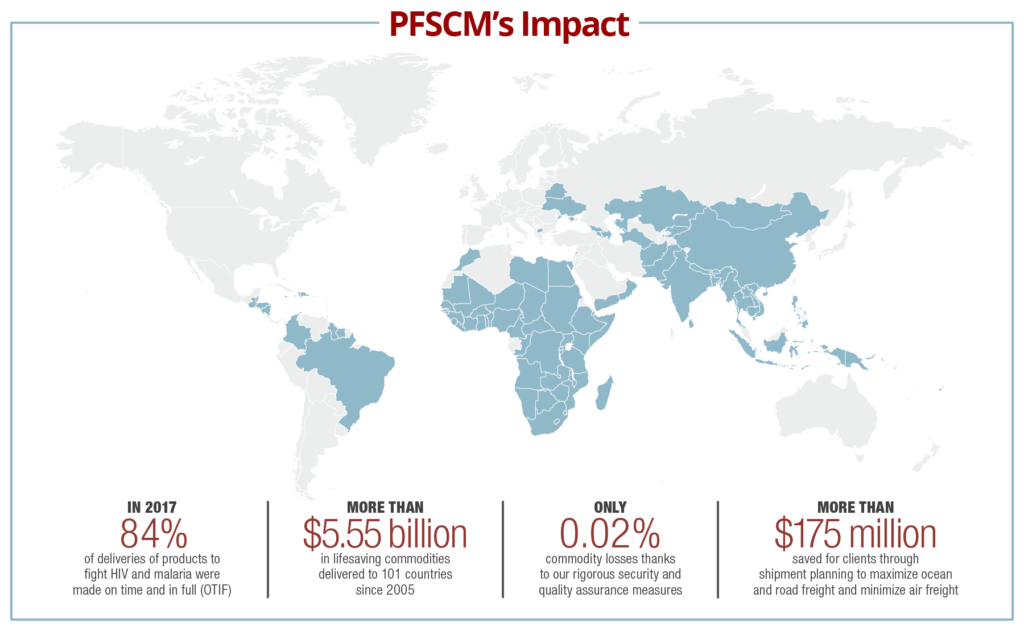This post has already been read 5255 times!
Adding value to health supply chains through data-driven solutions
The Partnership for Supply Chain Management has recently invested in a next-generation Control Tower, and underwent a digital transformation to improve supply chain visibility, and streamline collaboration among stakeholders.
Through this transformation, PFSCM has automated many of its key processes for faster, and smarter customer service; and laid the groundwork for current, and future digital supply chain innovations.
“We are better able to implement transformative changes. By that I mean five- or ten time improvements instead of 5% or 10% improvements.” -Charles Davenport, Chief Information Officer, PFSCM Share on XThe extensive, organization-wide process-, and culture change was both challenging and rewarding.

PFSCM Chief Information Officer Charles Davenport, who has been integrally involved in the digital transformation, shares his insights, and experiences of the journey so far.
Q: In the last two years PFSCM has undergone a digital transformation. Why did the organization undergo this transformation?
In short, the landscape that we operate in had evolved, and we needed to evolve with it. This means we had to completely adapt our processes, and systems to meet the changing market and client requirements; not only to remain competitive but also to ensure the best long-term outcomes for our clients.
Q. What did the transformation entail?
At its heart, digital transformation isn’t about the technology solution. The technology is just a catalyst. It’s about your holistic approach to transforming your people, processes, systems, and execution environment so they are all data-driven. Not to be cliché, but it is a paradigm shift in how you approach your day-to-day activities.
Q: What are some of the challenges you experienced in transforming and integrating the organization’s digital tools?
Anything that requires fundamental change is going to come with challenges. First and foremost, transformation takes time. It requires engagement from team members with the in-depth knowledge of operational and financial execution, system capabilities, and organizational processes. It also requires sustained change management support. When you are asking teams to streamline entire process flows, and use tools they haven’t used before to execute tasks in ways they haven’t done before, you are going to hit some bumps.
"Key to digital transformation is engagement from team members with the in-depth knowledge of operational and financial execution, system capabilities, and organizational processes." -Charles Davenport, CIO, PFSCM Share on XOur biggest challenges were providing the additional support the operational teams needed to navigate all the changes that we were asking them to deal with; and ensuring that the operational and system teams were collaborating sufficiently.
Q: In terms of IT systems, what did PFSCM look like before the transformation, and what does it look like now?
Our legacy systems were outdated, inflexible, and over customized. They were not designed with integration and digital engagement capabilities in mind, and they were also expensive to operate, enhance, and maintain.
“We are working towards a fully integrated solution that leverages modern prediction tools, machine learning, artificial intelligence, and IoT to autonomously manage the supply chain.”
Charles Davenport, Chief Information Officer, PFSCM
Our new technology solution is built with state of the art operational, financial, and reporting platforms. Each platform enables us to expand our integrations with stakeholders to drive digital execution of processes. It is flexible, scalable, and built from the ground up to support supply chain innovations like the Internet of Things, or IoT, and GS1.
Q: PFSCM implemented a new One Network Control Tower. Control Towers are well known in supply chain management; what critical functions does PFSCM use its Control Tower for?
We use One Network to execute all of our critical operational functions, from management of incoming client requisitions through order placement and logistics execution. Importantly, One Network enables digital execution of those processes, including direct collaboration with suppliers and freight forwarders within the platform. It also has native and custom built functionality to help our users manage their transactions proactively, enable managers to track transaction execution, and streamline how we deal with exceptions.
Q: Can you provide a practical example of how PFSCM’s network of suppliers, and 3PL service providers benefit from being connected via the Control Tower?
By connecting our suppliers on one platform, the barriers to process improvement and innovation are lower. For example, our staff identified bottlenecks related to supplier document management. In response, we were able to quickly agree with suppliers to provide key data from the documents electronically, and in turn to enable the data to be easily uploaded into the Control Tower. We are finding that the longer we collaborate within the digital space, the more our staff identify opportunities to further streamline our process interactions, and data exchanges with suppliers and 3PLs.
Q: What is the biggest benefit or success you have experienced using your Control Tower so far?
With our Control Tower solution in place — which encompasses our people, process, and technology — we are better able to implement transformative changes. By that I mean five- or ten time improvements instead of 5% or 10% improvements. We are also better able to mitigate the impact of exceptions. For example, our order turnaround is about 85% faster than it was just two years ago, and this is despite increased volumes being managed by smaller teams.
"With our Control Tower in place, order turnaround is about 85% faster than it was just two years ago, and this is despite increased volumes being managed by smaller teams." -Charles Davenport, CIO, PFSCM Share on XQ: From your experience thus far, how has digital transformation helped PFSCM deliver value for its clients?
We have shorter lead times across all stages of our transaction life cycle including quotation, order placement, supplier lead time, and freight execution. Our data driven processes result in fewer errors and exceptions. Additionally, our internal efficiencies are leading to a lower service cost, which means we are saving our clients money. We are also optimizing supply chain planning to generate further savings for our clients within our supply chain execution.
Q: PFSCM is in the business of procuring and delivering health products to mostly low- and middle income countries. How does the Control Tower ensure suitable quality products are delivered to patients?
We have done extensive work to create, and maintain a robust item and supplier master data management framework to ensure all procurement complies with product quality assurance requirements. Products in our system thus all comply with defined quality requirements, and this is a key first step in preventing any non-compliant products from entering the supply chain. One Network supports various chain of custody solutions for serial tracking, lot tracking, tracking through consolidation and deconsolidation, IoT operations, and targeted recalls. These innovations will continue to play a critical role in ensuring product integrity throughout the health supply chain.
Q: What is in PFSCM’s pipeline with regards to digital supply chain innovations?
We have made excellent progress in automating many of our transactional and operational processes, but we will continue to expand automation. In line with that we are further refining our document digitization strategy; and ultimately, we are working towards a fully integrated solution that leverages modern prediction tools, machine learning, artificial intelligence, and IoT to autonomously manage the supply chain.

This article published courtesy of PFSCM.
- Modernizing Defense Supply Chains - January 11, 2025
- Supply Chain Crossword Challenge - October 30, 2024
- Infographic: 6 Requirements for Transforming Supply Chains with Artificial Intelligence - June 10, 2024
